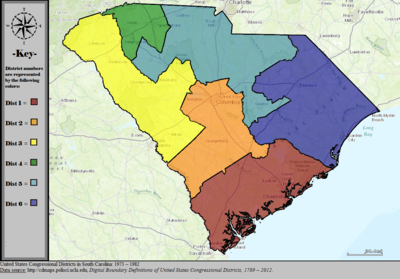
Interactive map version
There are currently seven United States congressional districts in South Carolina. There have been as few as four and as many as nine congressional districts in South Carolina. The 9th district and the 8th district were lost after the 1840 census. The 5th district and the 6th district were also briefly lost after the Civil War, but both had been regained by the 1880 census. Because of the state population growth in the 2010 census, South Carolina regained its 7th district, which had remained unused since the Civil War.
Contents
- Current districts and representatives
- Historical results
- District cities and counties
- First congressional district
- Second congressional district
- Third congressional district
- Fourth congressional district
- Fifth congressional district
- Sixth congressional district
- Seventh congressional district
- Historical and present district boundaries
- Obsolete districts
- Eighth congressional district
- Ninth congressional district
- See also
- References
On January 6, 2023, a three-judge panel from the U.S. District Court for the District of South Carolina ruled that the current 1st district lines were unconstitutional due to racial gerrymandering and would have to be redrawn April of that year. [1] The case, Alexander v. South Carolina State Conference of the NAACP , was argued on October 11, 2023, in the Supreme Court. [2] [3] [4] On March 28, 2024, the same district court that ruled the current 1st district lines unconstitutional, allowed for its use in the 2024 elections. It concluded that it would be impractical to create a new district map at the current time, mainly due to the upcoming military and overseas ballot mailing deadline of April 27 and statewide primaries on June 11. However, it still found the 1st district to be in violation of the 14th amendment and believed future litigation is possible after the 2024 elections. [5] [6]
On May 23, 2024, the Supreme Court—in a 6–3 decision—ruled the 1st district lines were constitutional, reversing the District of South Carolina's original ruling and officially allowing the current congressional map to be used for and past the 2024 elections. [7] [8] [9] It also remanded the case back to the district court to rehear other claims made by the defendants. [10]
































